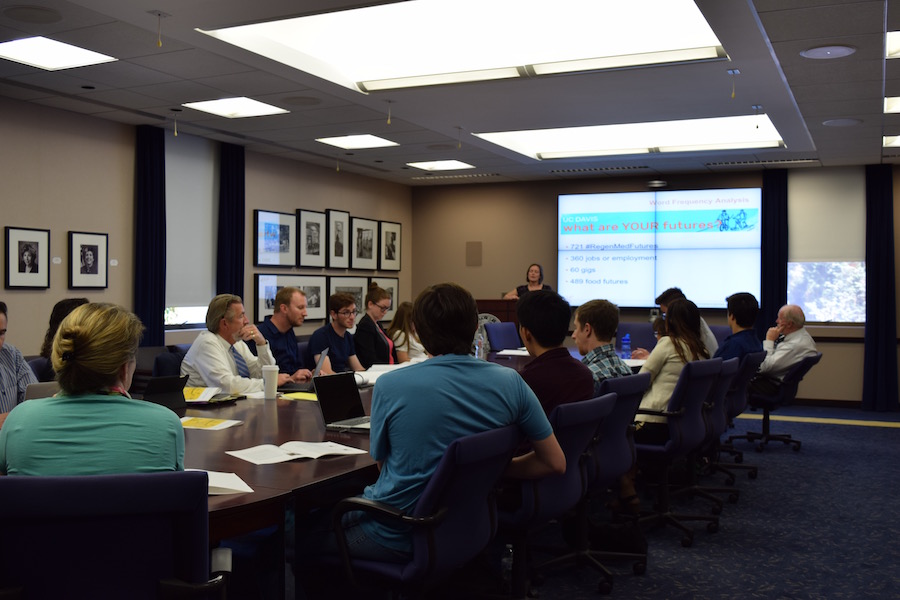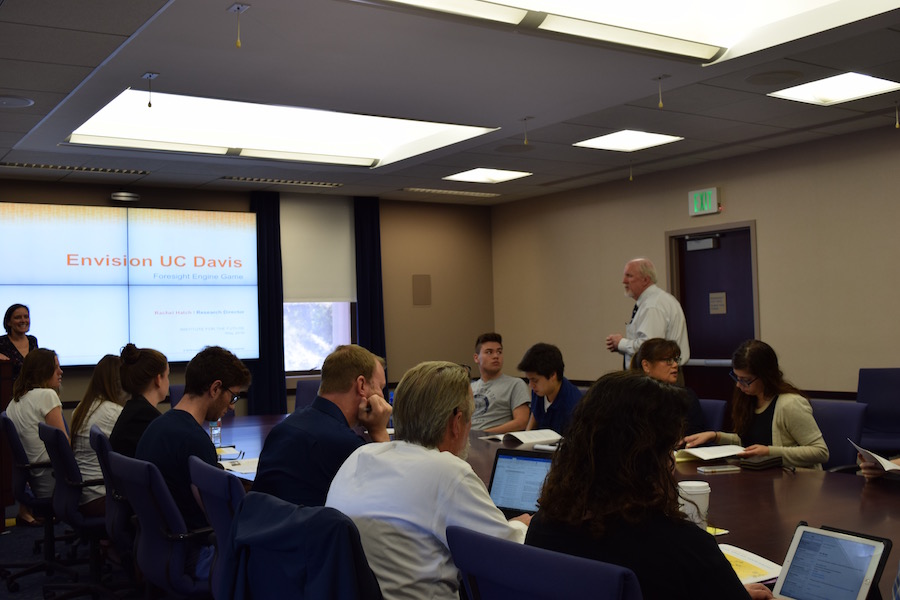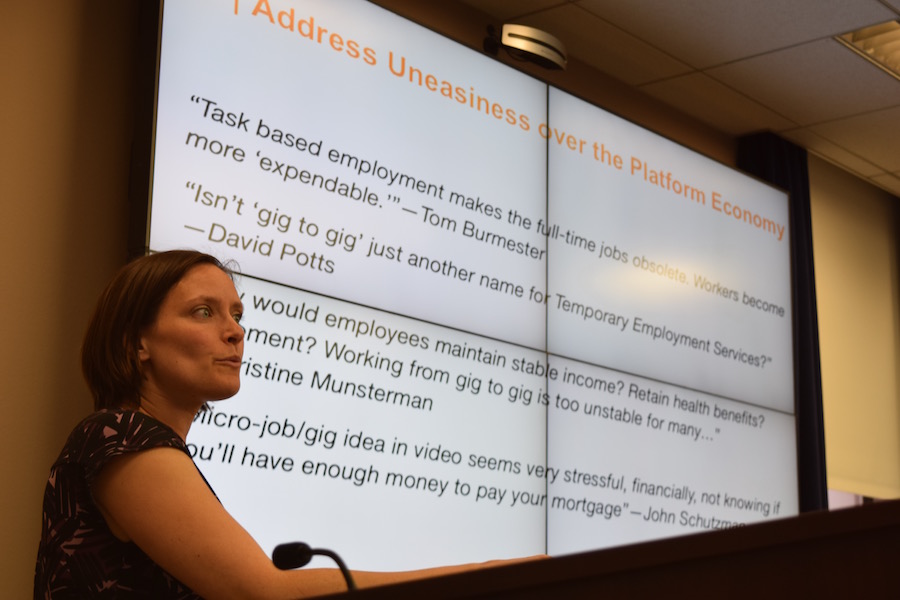
Project’s coordinators announced the results of the campus-wide interactive game.
On Tuesday, May 24, the results of the online interactive game “Envision UC Davis” were announced in a meeting hosted in Mrak Hall. The meeting consisted of a report of the game’s findings by project manager Rachel Hatch before transitioning to a question and answer session. Also announced at the meeting were the game’s “winners,” comprised of the undergraduate and graduate students who contributed most to the project.
The game was conducted from February 24 to 25 by the non-profit research forecasting firm, Institute for the Future, in cooperation with the university. Utilizing Foresight Engine, an online platform developed by Institute for the Future, the game invited players to collaboratively predict and discuss desired developments for the university that could be undertaken in the near future.
For the game, players submitted themed cards, each limited to 140 characters, that presented the basis of an idea to the community. The game encouraged users to build upon the ideas of other players by attaching their own cards to ones already played. Popular submissions could accumulate long chains of users’ cards, each incrementally developing the idea initially presented. The game, which updated in real time, tracked the progression of each idea and awarded points to players whose ideas attracted attention from other users.
“This was an opportunity to take the pulse of the community by engaging many more people that ever could have fit around a conference table,” Hatch said. “[We tried] to change people’s relationships with the school and give them an opportunity to think about the long term.”
In total 2,492 unique players comprised of UC Davis students, faculty, staff and alumni interacted to generate 28,226 ideas in response to the game’s prompt of imagining UC Davis’ future.
“To analyze the future is more about trying to leverage the collective imaginations of the community,” Hatch said. “There is no ‘data’ about the future so you need to be playful with the confines.”
Another goal of the game, as described by fellow project manager Gary Sandy, was to promote collaboration among the student body.
“By doing it on such a broad platform, students, regardless of their individual majors or their area of interest on campus, would be able to engage across the diversity of campus with other students they didn’t know,” Sandy said. “They could look at the ideas others had, share the ideas they had and comment on the ideas put forth.”
Last week’s presentation served as the Institute’s public release of its analysis of the data accumulated over the game’s two-day span. Among the ideas generated by players, the Institute identified five “Opportunity Spaces,” which they presented as specific areas of focus for UC Davis to consider in the future. These were calls for the to university to eradicate degenerative disease, to teach real-world skills, to explore micro-credentialing systems with alumni, to address uneasiness over the evolving labor market and to develop technologies to feed the world.
In addition to potential ideas for the future, the presentation also included five suggestions proposed by players that the university could begin developing immediately. These were desires for the university to enhance and extend Shields Library, to become a leader in bike network architecture, to increase internship opportunities, to conserve natural resources and to continue operating the game for future discussions.
In preparation for the project, the Institute, through its own research, identified what it classified as rising concerns within communities of higher education. Among these included trends of changing demographics, rising costs and student debt. Sandy described how the UC Davis and Institute planned to best accommodate the needs of the student body with the game.
“It was a cooperative process in which we shared UC Davis’ primary strengths, areas of agriculture, energy, water, natural resources, and start to determine how these emerging themes coupled with our strengths as a university,” Sandy said. “We wanted to address the challenge of how to create a university that better serves the needs of students in a way that still enables students to achieve a world-class education consistent with their needs for the future.”
Besides giving players the chance to chart UC Davis’ future, others were drawn to the opportunity to directly voice their opinions in such an open forum.
“One of the big issues sometimes in college, not just at UC Davis but in college in general, is that students have ideas and feedback for how they can improve what they see around them, but there is no real way for them to send that message on,” said Sam Westreich, a third-year graduate student pursuing a Ph.D. in genomics who accumulated the most points in the game’s duration. “With this game it was possible to crowdsource these ideas now and we can see that not only are our ideas valid and shared by other students, but hopefully they can also be put in place and that we can actually see them come to pass in the near future.”
Following the presentation, the Institute released the raw data accumulated in the game for anyone’s use. Kevin Cervantes, a fourth-year biological sciences major and the point leader among undergraduate participants, believes the data could serve as a valuable resource for organizations on campus.
“The data is actually going to be out and I could see ASUCD using those ideas,” Cervantes said. “This is a huge pool of ideas of what the students of the university want so I would love to see in the future ASUCD using those ideas to shape their agenda.”
Despite the program’s conclusion, Sandy hopes that its promotion of dialogue can have a permanent impact on the campus going forward.
“It will be up to students who could form their own groups and begin to advocate for some of these changes,” Sandy said. “The administration will read this report and start to undertake some of the initiatives. There are five-year and 10-year missions that can begin now and start to give us an immediate focus and an initiative to embark on pursuing some of these ideas laid out.”
Written by: Jack Raineri – campus@theaggie.org











